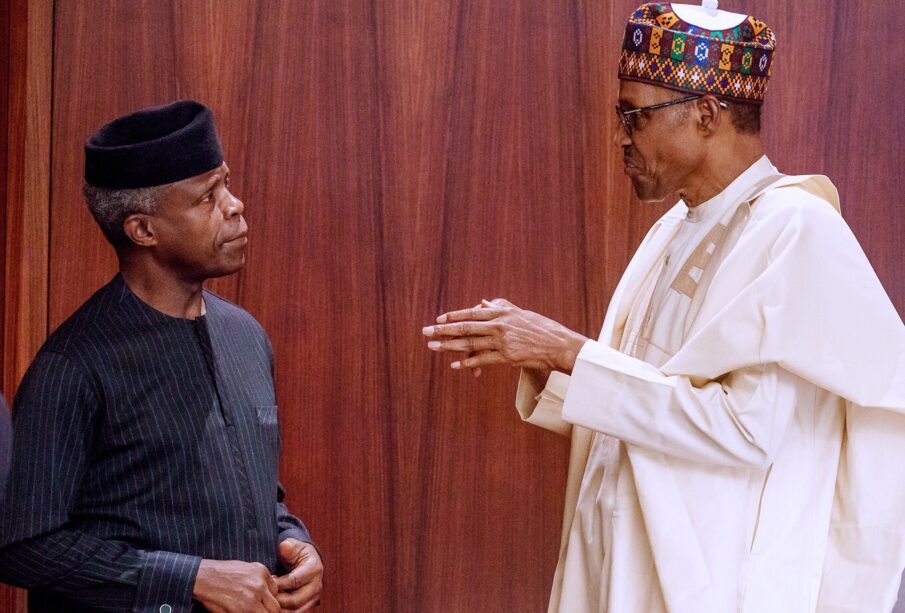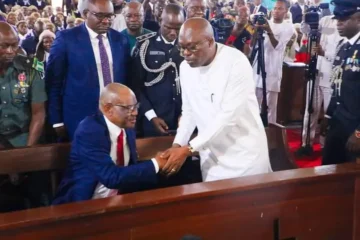
Osinbajo and Buhari
By Reuben Abati
A week ago, President Muhammadu Buhari travelled out of the country on a two-week medical vacation. He is expected back in the country next week. As has been the pattern since he assumed office in 2015, and he travelled on medical vacation eight months later, Nigerians again this time around raised the same concerns about why our leaders are always travelling abroad for medical reasons – they have failed to develop the medical infrastructure at home. In a country that used to be a medical tourism destination for persons as far away as the Middle East in the 70s, it is true that what we now have in the health sector in Nigeria is shameful, indeed the entire social sector is disgraceful. Despite the fact that we have some of the best brains and most talented people in the world, our leaders have to travel abroad for even simple procedures such as tooth ache, because they have failed to provide an enabling environment in Nigeria for excellence.
One senior citizen once told me that an expert who was described as the best in a particular medical field was recommended to him a few years ago, but he would have to go to South Africa to meet the particular specialist. He packed his bags, hopped on to a plane, and headed out. When he got to the South African hospital, the specialist that he was directed to see was a Nigerian. He protested that he did not travel all the way to come and see a Nigerian doctor. He had to be reminded that if he wanted the best consultant for his medical condition, he had better submit himself to the Nigerian! This is not an apocryphal tale: it is a fitting description of what has happened to Nigeria in virtually all fields of human endeavour be it sports or prostitution.
Hence, when the issue of the President travelling again for medical reasons came up, I thought we had been on this matter for too long. One, his handlers have told us that he had been consulting doctors in the United Kingdom long before he became Nigerian President, and that it would be unfair to expect him to change his doctors for populist reasons. His health has indeed been an issue, prompting many Nigerians to insist that given the experience of Presidential illness under President Umaru Musa Yar’Adua and now under President Muhammadu Buhari, presidential aspirants must be made to submit their certificates of medical fitness before aspiring to the highest office in the land. Since 2015, President Buhari has spent over 212 days abroad for medical reasons. In 2017 alone, he first travelled for 50 days, and then went back a second time for 104 days. In-between, the President has travelled for various periods of six, 15 or 12 days, and longer, with his trips having to be extended on more than one occasion.
I have had cause to argue that Presidents are human beings too. They can fall sick like other human beings. They and their families would also want them alive, and may seek medical care where they hope they can get the best. Besides, the President is 79. When Nigerians vote for an elderly man as President, they should very well expect that certain things come with old age, even if young men can also fall sick. The thing about democracy is that how a people choose their leaders has its direct consequences. To the delight of his family and supporters, however, President Buhari has managed to find the strength to remain on his feet and do two terms in office. In another 100 days, his successor would most likely have been known and he’d begin to pack out of the Presidential Villa. A new President would be sworn in, and he and his family would pack their own bags into the many rooms in the Villa. Nigerians would be left with the pains and gains of the Buhari administration. I hope we have learnt our lessons.
But there would be one lingering matter, to cut a long story short: how the Buhari administration handled the matter of presidential absence. We have seen in this regard, under this administration routine violations of the Constitutional order so frequently, we simply got used to it. It is an aberration that should not continue because it amounts to utter disregard for the rule of law. Every President takes an oath of office to defend the rule of law and the Constitution. The office of the Attorney General of the Federation exists to guide the government of the day about the constitutional order. When a government breaks the law, no matter how small, it is unacceptable from a principled stand. As Presidential candidates are now busy on the campaign trail, one question that they must be asked is whether or not in the event of absence from office, they would be willing to hand over power to their Vice President as required by law. Here is what the law says:
Section 145(1): “Whenever the President is proceeding on vacation or is otherwise unable to discharge the functions of his office, he SHALL transmit a written declaration to the president of the Senate and the Speaker of the House of Representatives to that effect, and until he transmits to them a written declaration to the contrary, the Vice President shall perform the functions of the President as Acting President”.
This is a very clear, unambiguous and direct constitutional provision. Lawyers understand that when the words used in the Constitution are clear and unambiguous, they must be interpreted in a literal sense. The use of the word “shall” by the framers of the Constitution also means that the command of the law is obligatory, not discretionary. Whereas Section 5 of the Constitution vests Executive powers in the President, the same constitution in parts defines circumstances under which he cannot exercise absolute powers or attempt to rewrite the law, and one of those regards has to do with when he is absent from office, or incapacitated or he dies. Indeed, Section 145 (2), goes further on the matter of Presidential absence thus: “In the event that the President is unable or fails to transmit the written declaration mentioned in subsection (1) of this section within 21 days, the National Assembly shall, by a resolution made by a simple majority of the vote of each House of the National Assembly, mandate the Vice President to perform the functions of the office of the President as Acting President until the President transmits a letter to the President of the Senate and Speaker of the House of Representatives that he is now available to resume his functions as President”.
There is nowhere in the extant law that the Constitution says that the President of Nigeria can leave town as he wishes without informing the National Assembly formally and without transferring authority to the Vice President. This created a constitutional crisis in 2010 during the Yar’Adua Presidency when in the face of the terminal illness of President Yar’Adua, and eventual death, the country was left in limbo. The country was dragged through needless tension and controversy as a result. The case has been different under President Buhari because each time he chooses to go AWOL on Nigerians, he still returns, and we all carry on nevertheless, but this does not make his violation of the law excusable. It must be further remembered that President Buhari’s legal advisers have consistently thrown him under the bus by giving him wrong legal advice with regard to either court rulings or the Constitution. The President of Nigeria cannot be above the laws of the land, the same laws that he is sworn to protect under the seventh schedule of the 1999 Constitution.
It is on record that the President has only transmitted power formally to the Vice President twice since 2015 – in 2016 when he proceeded on a 10-day vacation, and once in 2018. Since then, the President simply travels when he wants to and returns as he wishes on either official or private trips. Where the trip is official such as attendance at international conferences, state or working visits, the absence is understandable, but when the President travels for medical reasons for a much longer period, and he is not on duty, he is duty bound to hand over officially to his Deputy. The argument that the President of Nigeria can go away for two or three weeks for private reasons, and govern Nigeria from a remote location amounts to bending the law on its head. He is not allowed to go away without leave or to embark on a frolic of his own. He cannot transfer power by word of mouth either. He must put it in writing. He must be accountable to the Nigerian people.
Nigerians are even more rightly concerned because the present National Assembly lacks the spine or the moral courage to invoke Section 145(2) of the Constitution. This is a National Assembly that is an extension of the Presidential Villa and whose leaders openly confess their loyalty to the Executive arm of government. Some of our lawmakers even go about claiming that they are “adopted sons and daughters” of President Buhari. Is that why they must always look the other way? In more decent societies, their constituencies will demand concrete proof of their adoption! Or “abduction?” And even that does not justify the cherry-picking approach to the rule of law under this administration, which ironically has a lot to show in the area of law reforms and significant legislation, but when it comes to the constitutional order, problems abound.
One reason that has been given is that Vice President Osinbajo cannot be trusted because of the way he “behaved” when in 2018, the President respected the Constitution and formally handed over power to him. It is alleged that he started behaving as if the President would not return. His handlers began to project him as a better alternative. They were all over the media “selling” Osinbajo as a healthier, more energetic, more people-friendly alternative. It was said that the Vice President even had the temerity to sack the Director General of the Department of State Security, a man from Katsina, the President’s own kinsman. To worsen matters, a group of Yoruba leaders visited Osinbajo in the Presidential Villa in Buhari’s absence! That was the last time his principal formally sent any letter to the National Assembly whenever he was away. There are certain forces in the corridors of power who have never forgiven Professor Osinbajo for openly showing enthusiasm or ambition.
This was confirmed when he tried to run for the Presidency on the platform of the All Progressives Congress (APC) in 2022. They led him on and stopped him. What we are dealing with is one of the major omissions in the Nigerian Constitution which does not assign any concrete roles to Deputies either at the state or Federal level. A Deputy Governor or a Vice President is considered “a spare tyre”, to be kept to a side of the vehicle and can only be called to service whenever there is an emergency. When such emergencies occur, it must not be because the spare tyre, jumped out of its place on its own volition, to cause havoc. Vice President Osinbajo is useful when he is called upon to attend meetings and events where he is required to sound brilliant and articulate, but when it comes to the exercise of power and authority, he is closely monitored because he is not expected to do so. This is a “spare-tyre” dilemma, and it is why Nigerians must take a second look at the exercise of Executive powers. In a new Constitution, specific roles must be assigned to Deputies. The talk that “it is a joint ticket” is a foreign concept that does not work here. A Nigerian Governor or President is technically an absolute monarch. We mut correct that.
Many Nigerians now insist on the full disclosure of the medical condition of the President, but really, it is not only in Nigeria that Presidents go extra length to hide their illnesses. Woodrow Wilson didn’t want the American public. to know that he caught the Spanish flu in 1919. Franklin D. Roosevelt was in a wheelchair and also used crutches but he downplayed his physical condition. JF Kennedy was sickly as a child and even as President, he struggled with a cocktail of ailments including chronic back pain. In 1893, President Grover Cleveland disappeared for four days to have surgery secretly on a yacht at sea to remove a tumour. This story is told in Matthew Algeo’s The President is a Sick Man. The whole idea is to project the President as a strong, healthy leader and to prevent the President’s state of health from becoming a political liability. The only difference however is that today, US Presidents do not have to travel to the sea for treatment or go into hiding as President Cleveland did in 1893. In more contemporary times, US Presidents, with the notable exception of President Donald J. Trump have shown greater confidence in disclosing their health condition. In 1985, President Ronald Reagan transferred power to Vice President George Bush for eight hours while he underwent surgery. In 2002 and 2007, President George W. Bush also transferred authority to VP Dick Cheney while he was admitted for a colonoscopy procedure. In November 2021, incumbent President Joe Biden transferred power to VP Kamala Harris when he was admitted into hospital for the same procedure, making her the first woman in American history to act as President even if only for 85 hours! The relevant law in the United States is Section 3 of the Twenty-Fifth Amendment which is in pari materia with Section 145 (1) (2) of Nigeria’s 1999 Constitution.
In Nigeria, it is usually a tug-of-war to get the President or a Governor to hand over power and authority during a period of incapacity or absence. Our problems here include ego, lack of trust, ethnicity, religion, superstition and the menace of the informal power structures in the corridors of power whose promoters tie their destiny like an umbilical cord to the survival of their patron-principal in office. Such characters would do anything and everything to subvert the rule of law. We must decry this. The next President of Nigeria must not at any time go AWOL on Nigerians out of fear, insecurity or both on the grounds of medical vacation abroad. A law-abiding President needs strong legal advisers who are committed to the supremacy of the law, not politicians who bend the law according to the changing vagaries of the weather. The consequence of wanton Presidential violations of the Constitution is impeachment, but who will dare challenge the monarch? Certainly, not a stomach-driven National Assembly.
Culled from ThisDay











